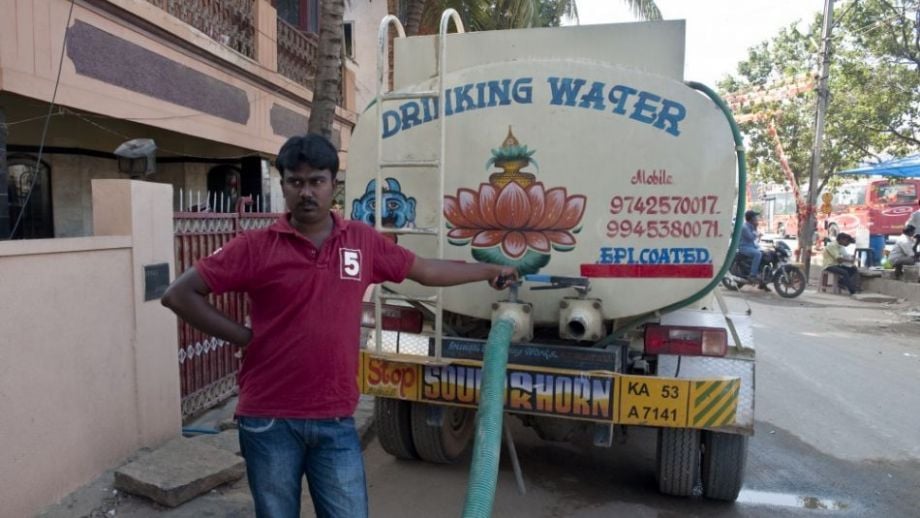Along with gated apartments, office complexes and unprecedented growth in Bangalore, India, came a dearth of one basic resource: water. To make up for the scarce supply, residents turn to tankers operated by private water companies — or, as they’re known colloquially, “water mafias.” In Forefront this week, Bangalore-based writer Mark Bergen explores the economics and environmental issues at stake, all the while asking how to quench the thirst of the world’s 18th largest city.
Anuj Pratap Singh has a water problem. He didn’t have it when he came to Bangalore 10 years ago. He didn’t have it when, four years later, he moved to the outskirts of town, closer to his work as an engineer. He still didn’t have it when he discovered that his new home, while technically within the city’s bounds, wasn’t connected to the city’s water system. The complex, then home to around 20 families, had four borewells funneled to the ground. Potable water was plentiful.
Then, about six months ago, his problem struck: The borewells ran dry.
With no utility or groundwater, Singh and others in his complex did what many residents of Indian cities now must do. They found a mobile number and called the water mafia.
Arriving shortly thereafter was one of thousands of “tankers” — private trucks with cylinder tanks attached and water in tow, its source a mystery. Once, when the price ticked up, Singh and his neighbors tried another vendor. A second deliveryman showed up for a couple days and then suddenly stopped. Somehow, the first had dissuaded him. Tankers are territorial. To Singh, this is hardly a solution for his problem.
Actually, Singh has two water problems. A native of the Andaman and Nicobar islands, a sparse archipelago of about 300,000 people far off India’s eastern coast, he pined for open space. Whitefield, the suburban enclave where he moved, had it in spades. Yet once he arrived, the open space vanished quickly, and services did not keep up. Not only is he bereft of pipes that bring water in, but also ones that take water out.
To send wastewater out, the complex calls in another tanker specializing in sewage, which also operates in unregulated shadows. All 160 families that live behind the complex’s gates pay 1 lakh rupees a month together, for a total of around $1,800, to bring water in. Then they pay 1.5 lakh rupees, about $2,700, to send it out.
Across all of Asia, millions face problems like Singh’s as they watch a once-abundant natural resource disappear. Global warming and soil erosion have pushed sea levels near Asian coastal cities to alarming heights, with devastating death tolls waiting in the wings. Water, many have claimed, may be the flash point of the next continental war.
But in Bangalore and its suburbs, water is not a geopolitical conundrum. It is an economic one. While Singh — highly educated, productive and relatively affluent — may be a rarity in some parts of Asia, he is one among many here. Bangalore is the Asian megacity to come: It is full of the region’s most promising feature (new, eager middle-class workers and consumers) and its most dreadful (explosive, unplanned, chaotic sprawl). And it is heading squarely into a crisis. For, in little time, the metropolis known as the Garden City could become an enormous urban desert.
To read more, subscribe to Forefront. Already a subscriber? Click here to continue reading.








